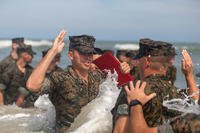I was sitting at an event last week, and the talk turned around to my job. I explained that I'm a personal financial educator and that I write for Military.com. I also threw out a pitch that I hadn't yet found anywhere at this post to do actual individual counseling and that I needed to continue to accrue my hours for when I eventually sit for the Certified Financial Planner examination. I told them all that once I got my kids settled into schools, I would be looking for people who wanted me to work with them.
There was the usual general murmur of, "I can use all the help I can get," and, "Pick me," and then one older spouse said, "Well, I'm sure you will find lots of younger enlisted that could use the help."
I was speechless.
I have never considered the need for good financial education to have anything to do with age or rank. Or any other grouping, either. I've met financially brilliant, super-young, female spouses of enlisted men. I've met financially illiterate older officers. And I've met every combination in between. Financial education and advice has absolutely nothing to do with your skin color, your rank (or non-rank, if you are a spouse), your age, your shoe size, your religion, or your ethnic background. In fact, most financial counselors and educators will tell you that they still have a lot to learn, and that they benefit from the advice of others. I've actually been planning to do a one-time sit down with a friend who is a financial planner, to get an outsider's view of my own family's financial situation. And I'm willing to spend good money for that advice, because I think it is important.
I do agree that many of our younger service members are working with smaller incomes, and it can be particularly challenging if you've taken a pay cut to enter the military, or if you enter the service with substantial debt. Having a family while still earning a smaller paycheck adds to the challenges. However, lumping people together into groups is rarely a good idea. I think it is small-minded and a bit rude to assume that younger, enlisted families need financial education more than others.
If you are a person, and you have any dealings with money, you can always learn more, discover new things, and make small tweaks to improve your overall financial foundations. Don't let rank or age prevent you from accepting the many resources available to you, and especially don't let it prevent you from seeking help if you need it. Not everyone is good at everything, and if money isn't your thing, it is a great idea to seek help from someone who finds it fascinating, and enjoys learning, and working with financial concepts.
If you suspect that there is more you could learn, check out the bjillions of resources available online. You can also your installation's family readiness center to see what services they provide. They probably have a financial readiness person on the staff, and they might have a Military and Family Life Consultant Personal Financial Counselor. In addition, Military One Source offers in-person and online financial counseling with anonymity from your local resources. If you've got a Navy-Marine Corps Relief Society nearby, they offer financial education and counseling, and most offices are willing to help service members from other branches, as well.
If you have it all together financially, getting extra education and help sets a great example for those in your command who may not be as financially savvy as you. And if you are a leader, offering and supporting financial education and counseling is smart business. Financially together troops make your job much easier.
Don't fall into the trap of thinking that financial education is for someone else, or that financial education is negative. Learning is always a positive, and we all have lots to learn. Take advantage of the programs available, and encourage others to do the same.








